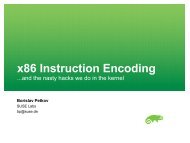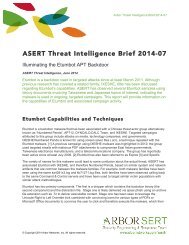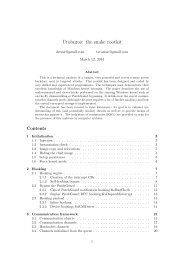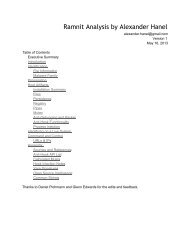Resources
1Va83Wx
1Va83Wx
- No tags were found...
You also want an ePaper? Increase the reach of your titles
YUMPU automatically turns print PDFs into web optimized ePapers that Google loves.
www.osr.com<br />
Page 13<br />
(CONTINUED FROM PAGE 12)<br />
The reason for updating cached valid data at the time of a paging write is due to the third type of valid data: writes made via<br />
memory mapped views. In this case a page can be modified outside of the file system or Cache Manager’s control or awareness,<br />
resulting in the otherwise paradoxical valid data beyond valid data length. It is not valid in the presence of memory mapping to<br />
assume that pages beyond valid data length must be zero due to this condition. For the same reason, a call to CcZeroData is not<br />
guaranteed to result in zero data, because pages may have been modified that the file system does not yet know about, and those<br />
pages must be considered valid. CcZeroData will silently decline to zero pages in that case.<br />
Although dirty data is tracked at the page level, valid data is a byte level concept. A mapped view may also modify data on the<br />
same page as a cached write. When this occurs, the Cache Manager will attempt to write the page, but is not aware that it<br />
contains data which is beyond the cache’s current valid data length, and would not be included in any AdvanceOnly callback. It is<br />
important that the file system allow the cache to write the page (as the cache will not allow the mapped page writer to write it),<br />
but it follows that the file system must be willing to update cached VDL via CcSetFileSizes during the paging write to ensure a<br />
subsequent AdvanceOnly callback covers the entire range that was written. Because valid data is a high water mark, this issue is<br />
only problematic for the final page of valid data, where valid data length falls within that page.<br />
Cache Manager Cooperation, or Not<br />
The Cache Manager optimization is used by NTFS but is optional for other file systems. A file system may indicate that the Cache<br />
Manager should not attempt to track valid data by using the special value of MAXLONGLONG as the valid data length in a<br />
CcSetFileSizes call. Having done so, the file system must take care to update valid data on disk in response to all paging writes.<br />
This is the approach that ReFS takes as of Windows 8.1 and Server 2012 R2, leaving all data potentially valid in the cache and<br />
zeroing to the disk as needed when paging writes occur.<br />
Regardless of the approach chosen, some form of synchronization is required when implicitly zeroing to ensure that user data is<br />
not destroyed inadvertently by racing writes to different ranges. The change between NTFS behavior and ReFS behavior in 8.1 is<br />
where this synchronization is performed. In NTFS, because data is zeroed through the cache with CcZeroData, synchronization<br />
must be provided with extending cached writes. In ReFS, where data is zeroed on disk and not through the cache, synchronization<br />
is used at noncached or paging write time, eliminating the need to serialize cache extensions.<br />
This difference surfaces via differing implementations of FSCTL_QUERY_FILE_REGIONS. Because NTFS only remembers and<br />
enforces against cached VDL, it can only answer queries for cached VDL (FILE_REGION_USAGE_VALID_CACHED_DATA). Because<br />
ReFS only remembers and enforces against on disk VDL, it can only answer queries for noncached VDL<br />
(FILE_REGION_USAGE_VALID_NONCACHED_DATA). In both cases, note this API has limited applicability because there is no<br />
guarantee that data outside of a valid range contains zeroes due to the memory mapped writing case discussed above, and in the<br />
case of NTFS, it is also not guaranteed that ranges within the valid range are necessarily stored on disk.<br />
The definition of FSCTL_QUERY_FILE_REGIONS allows for a file system to implement validity tracking on a per-range basis as<br />
opposed to a high water mark, which is what classic valid data length describes. Future versions of ReFS exercise this capability by<br />
recording on a much finer granularity which regions contain valid data on disk, eliminating the need for implicit zeroing and the<br />
synchronization required to implement it.<br />
Malcolm has been working on File Systems and Filters at Microsoft for over a decade.<br />
Despite eschewing UI, he occasionally contributes to fsutil, and is the author of the<br />
hugely unpopular sdir tool at sdir.codeplex.com. He can be found loitering on ntfsd.<br />
Follow us!<br />
I TRIED !ANALYZE-V...NOW WHAT?<br />
You’ve seen our articles where we delve into analyses of various crash dumps or system hangs<br />
to determine root cause. Want to learn the tools and techniques yourself? Consider<br />
attendance at OSR’s Kernel Debugging & Crash Analysis seminar.<br />
Next Presentation: Amherst, NH 9-13 November<br />
The NT Insider July - August 2015 © OSR Open Systems <strong>Resources</strong>, Inc.







